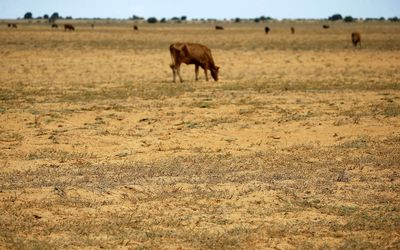High red meat prices could mean a crash in the market
by Bekezela Phakathi,
2016-01-29 16:55:08.0
RED meat sales are likely to plunge in the coming months as consumers resist price increases in beef, triggered by the drought.
"It is possible that consumer resistance can increase, especially if alternative sources of protein are available," John Durr, the chairman of the Red Meat Producers Organisation in the Western Cape, said on Friday.
SA is in the throes of its worst drought since 1992, with the agricultural sector being hardest hit.
Farmers are battling to harvest crops or feed livestock. Livestock producers across SA are paying up to R1,000 a tonne more for feed than last year because of the drought, according to Agri Western Cape.
The current poor exchange rate and shortage of lamb will also affect the potential import of mutton to make up for the shortages in this sector.
"In the central and northern cattle grazing areas and some sheep grazing areas, many herds have been reduced (slaughtered or sold). The remaining female animals will not produce the normal calf and lambing percentages because of the lack of feed during mating season. The end result is a shortage of lamb and weaners for feedlots," Mr Durr said.
He said feedlots were under more pressure because of the shortage of maize products, which would will only be available at very high prices.
"Prices will continue to rise as the shortages increase. Any possible increase in milk prices of producers in the near future, can also cause the slaughter cattle from this sector to decrease drastically, putting further pressure on the factory meat prices," said Mr Durr.
All these factors point to increased consumer and producer prices, especially in the second half of the year due to shortages on the supply side.
"Consumer prices (could be) too high … it is possible that consumer resistance can increase, especially if alternative sources of protein are available," Mr Durr said.
He said as an "aid measure", a number of cattle, especially female animals, were moved from the drought stricken areas in the north of the country to the Southern Cape.
Many cattle and sheep producers in the Swartland and West Coast region have reduced their herds or even sold them completely.
"The biggest crisis that may arise in this area is if the availability of drinking water for animals and humans starts running out. Reports of wells that have dried up and empty dams have been received," said Mr Durr.

Picture: REUTERS/SIPHIWE SIBEKO
RED meat sales are likely to plunge in the coming months as consumers resist price increases in beef, triggered by the drought.
"It is possible that consumer resistance can increase, especially if alternative sources of protein are available," John Durr, the chairman of the Red Meat Producers Organisation in the Western Cape, said on Friday.
SA is in the throes of its worst drought since 1992, with the agricultural sector being hardest hit.
Farmers are battling to harvest crops or feed livestock. Livestock producers across SA are paying up to R1,000 a tonne more for feed than last year because of the drought, according to Agri Western Cape.
The current poor exchange rate and shortage of lamb will also affect the potential import of mutton to make up for the shortages in this sector.
"In the central and northern cattle grazing areas and some sheep grazing areas, many herds have been reduced (slaughtered or sold). The remaining female animals will not produce the normal calf and lambing percentages because of the lack of feed during mating season. The end result is a shortage of lamb and weaners for feedlots," Mr Durr said.
He said feedlots were under more pressure because of the shortage of maize products, which would will only be available at very high prices.
"Prices will continue to rise as the shortages increase. Any possible increase in milk prices of producers in the near future, can also cause the slaughter cattle from this sector to decrease drastically, putting further pressure on the factory meat prices," said Mr Durr.
All these factors point to increased consumer and producer prices, especially in the second half of the year due to shortages on the supply side.
"Consumer prices (could be) too high … it is possible that consumer resistance can increase, especially if alternative sources of protein are available," Mr Durr said.
He said as an "aid measure", a number of cattle, especially female animals, were moved from the drought stricken areas in the north of the country to the Southern Cape.
Many cattle and sheep producers in the Swartland and West Coast region have reduced their herds or even sold them completely.
"The biggest crisis that may arise in this area is if the availability of drinking water for animals and humans starts running out. Reports of wells that have dried up and empty dams have been received," said Mr Durr.





















Change: 0.90%
Change: 0.73%
Change: 2.97%
Change: 0.96%
Change: -1.95%
Data supplied by Profile Data
Change: 0.00%
Change: 0.00%
Change: 0.90%
Change: 0.00%
Change: 0.00%
Data supplied by Profile Data
Change: 0.03%
Change: 0.01%
Change: -0.21%
Change: 0.00%
Change: -0.58%
Data supplied by Profile Data
Change: 0.00%
Change: 0.00%
Change: 0.00%
Change: 0.00%
Change: 0.00%
Data supplied by Profile Data